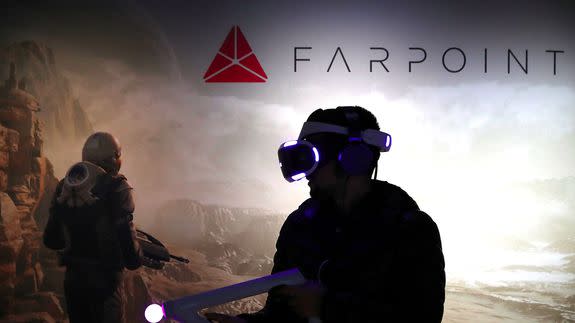Virtual reality should stop trying to imitate traditional gaming

At PAX Australia on Friday, broadcaster and panel host Nic Healey went and asked the question: "When am I going to get my virtual reality Skyrim?"
Five leading local voices in VR development were in Melbourne to discuss the VR "hype train," and some of the day's biggest themes were existential. Most of all, how much should the emergent industry take from traditional gaming, and how much should it leave behind?
SEE ALSO: Virtual reality headset HTC Vive announces first Australian stores
Time seemed on everyone's mind. The most praised video games of recent years often present immersive worlds in which players can get lost for days. As Healey pointed out, most VR experiences so far last in minutes not hours.
We should consider the practicality of putting your body through the challenges you used to manipulate on a screen with just your thumbs, Emre Deniz, a developer at Opaque Media, pointed out: "None of you can swing an axe for eight hours straight."
Omg time for another panel about #vr with my m8s @Emre_C_Deniz @Gaohmee @stephnet @scottreismanis @dr_nic at @PAXAus at @GamesWeekMelbs pic.twitter.com/djMEy9lMOi
— Sally Kellaway (@soundsbysal) November 4, 2016
Consumers may have to relearn, for VR's sake, that extreme length does not always indicate value.
Sally Kellaway, the senior VR audio designer for Zero Latency, works at a Melbourne startup that's created free-roam VR in an area about the size of a basketball court. She said the team's immersive zombie experience can last at least 40 minutes, but they're venturing into shorter pieces.
"We have just made a couple that are 12-minutes long, and it's so we can offer a range of different genres and different experiences," she said. "I feel like bite sized content is quite good. It means you can jump in and then jump out again. Try something new."
The shortness of most VR experiences should not be considered gaming failures, the panel agreed. The game designer Jennifer Scheurle, for one, suggested the creator community is and should be responsible for easing newcomers into the technology — that's where short content can work.
This is the period, as the HTC Vive and Playstation VR enter the market, when you teach people how to move and interact in the immersive format.
"There's always this classic period when people adapt to a new medium," Liminal VR creative director Stephanie Andrews added. "We don't want people to be overwhelmed, made sick, and put them off."
In many ways, the shortness of VR experiences can be chalked up to experimentation. After all, there's a lot to learn from video games, as developers, but also a lot to abandon and relearn.
"We have to let go of the traditional railroad experiences that we're used to in traditional games," Scheurle said. She suggested the reason why some people are skeptical about VR is they see developers attempt traditional game mechanics in VR and then find they don't work.
"How do I actually move around in VR without vomiting into a bucket? We see that we move, but our body doesn't feel the same sensation," Scheurle explained. "That's definitely an issue that comes from traditional game development."
Part of the challenge is letting go of your control as a developer. "It's almost as if you're designing the game with the person [experiencing it]," she added. "They have so much more agency and a leader role, almost, in the experience they're going to have."
Holy shit, we filled the Dropbear Theatre to the last spot with our #VRPAX panel! Thank you all for being a great audience! #PAXAus2016 pic.twitter.com/Fyuu4WwJ86
— Jennifer Scheurle (@Gaohmee) November 4, 2016
That doesn't mean VR designers can absolve themselves from responsibility for what the user may experience.
Formerly, once you pressed "play" in traditional games, that implied consent. Given the physicality of VR, the experience is likely to be far more varied and personal, and so consent is blurrier. If you place someone on a rickety bridge above a canyon in VR, for example, their experience of that is going to be terrifyingly unique if they're afraid of heights.
"It can affect people on a very personal level, much more personally than any other format," Andrews added.
Deniz, for one, was emphatic there was more to drop from traditional gaming development than to bring to VR.
"VR wasn't games to begin with," he said. "We're essentially appropriating a space that has existed since the 1960s ... VR design and game design are not mutually exclusive, but they don't always overlap."
